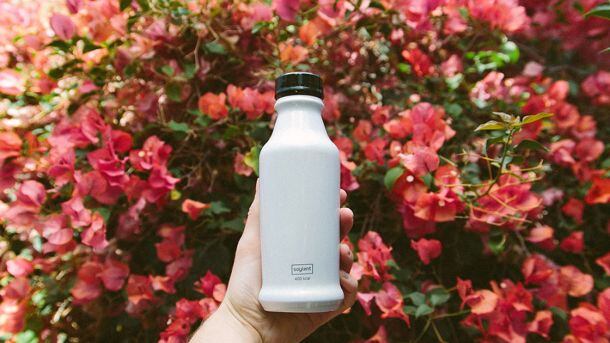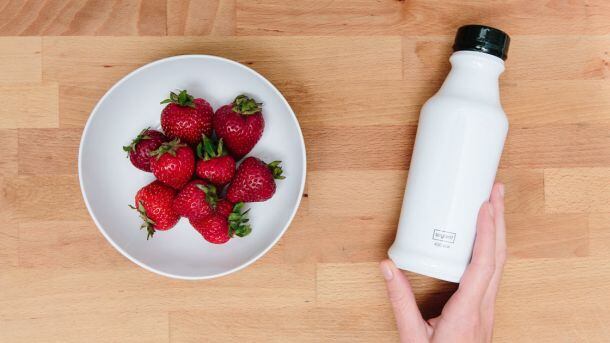In the post written by VP of Research Samy Hamdouche, Soylent (which makes powdered and ready-to-drink beverages offering 'complete nutrition' for busy people on the go) urges consumers to put aside pre-conceptions about biotech crops and look at the evidence.
Having listened to arguments from both sides, says Hamdoche, he is simply not persuaded that the global food supply would be safer or more sustainable by ditching genetically engineered crops.
There’s nothing natural about chemical mutagenesis and other ‘non-GMO’ plant-breeding techniques
For a start, he said, there is no inherent reason why a crop that has been produced via GM technology would automatically present greater risks than a crop produced using techniques routinely employed in ‘conventional’ (non-GM) plant breeding, from radiation and chemical mutagenesis to induce mutations in plant DNA, to ‘wide cross’ hybridization.
“Since the 1920s, breeders have been exposing seeds to radiation and chemical mutagens in order to increase the amount of genetic variation per generation. The induced mutations, which are largely untargeted, have been used to improve several major crops, leading to the creation of over 2700 “non-GMO” varieties, many of which may be labeled as organic.
"The ancient technique of grafting—the joining of plant tissue from two plants—has been shown to result in the exchange of entire genomes between plants cells. Additionally, the same process of gene transfer from bacteria to plants implemented in genetic engineering occurs ubiquitously in nature. Evidence of such horizontal gene transfer has been discovered in common staple crops, such as the sweet potato and tobacco, demonstrating how nature has been creating its own ‘GMOs’ all along.
“Our crops and livestock have always been in a state of genetic flux, and agricultural production incorporates many technologies with nonzero risk. By iterating on less precise tools, genetic engineering enables more efficient and targeted means of genetic alterations and improves upon more hazardous or unsustainable non-genetic crop technologies. From this perspective, it is clear that many of the popular arguments against GE foods are, at best, arguments against non-GE agriculture.”

GMO…. not just about soy and corn
Meanwhile, GE is a broad-ranging set of technologies encompassing multiple applications, each with their own costs and benefits, and the focus on herbicide resistant crops has diverted attention from scores of other applications of ag biotechnology, particularly in relation to tackling plant viruses, he said, noting that a genetically engineered papaya had saved the Hawaiian papaya industry from a devastating plant virus.
“The pipeline of GE crops highlights the worthy efforts to continue delivering more nutritious, sustainable, and efficient crops, including blight-resistant chestnuts, bacteria-resistant oranges, high-calcium carrots, non-allergenic peanuts, rice with lower methane emissions, and drought-tolerant corn, sugar, and wheat. That the benefits are largely societal, and perhaps more difficult for the individual consumer to appreciate, illustrates the importance of considering the societal impact of our food choices.”

Soylent 2.0 - the ready-to-drink version of Soylent’s flagship meal substitute and one of the first food/beverage products formulated with high oleic algae oil - contains 400 calories per 414ml bottle (47% calories come from fats, 33% come from carbs, and 20% come from protein, with vitamins and minerals designed to provide 100% daily values over 2000 calories, or 5 bottles).
Resistant weeds are not unique to glyphosate
As for pesticides, he said, it is a well-documented fact that insecticide use has gone down significantly since the introduction of Bt crops engineered to produce their own insecticide from the soil bacterium Bacillus thuringiensis (Bt).
And while resistance to glyphosate (a herbicide used in conjunction with many GM crops) is also well-documented, he said, this was not a reason to throw the baby out with the bathwater, give that farmers are constantly having to adapt the tools they deploy to keep pests, weeds and other threats to plants at bay, whether their crops are genetically engineered or not.
“Resistant weeds are not unique to glyphosate, and were observed before the advent of glyphosate-resistant crops. Although the increased utilization of herbicides in both GR and non-GR agriculture continues to foster the evolution of resistant weeds, current levels of herbicide usage are likely lower than would be the case if GR crops did not exist.
"Importantly, the herbicides that have been displaced by increasing use of glyphosate are known to be more hazardous."

Soylent CEO: ‘Just because something is ‘natural’ doesn’t mean it’s good for you’
Speaking to FoodNavigator-USA earlier this year after launching on Amazon, Soylent CEO Rob Rhinehart said he understood that Soylent – which has an ingredients list that is long, complex, and full of things you can’t pronounce - might appear to be moving in the opposite direction to many other food start-ups.
But clued up consumers understand that just because something has a name you can’t pronounce doesn’t mean it’s bad for you, and “just because something is ‘natural’ doesn’t mean it’s good for you,” said Rhinehart.
Several ingredients in Soylent products are derived from GE crops or micro-organisms, says Soylent:
Soylent 1.6
- Soy Protein Isolate (soybean)
- Maltodextrin (corn)
- Canola Oil (canola)
- High oleic algal oil (made from an oil-generating algae strain originally discovered in the sap of chestnut tree that has been genetically engineered to increase its productivity. However, the final oil does not 'contain' GMOs.)
- Modified Food Starch (corn)
- Soy Lecithin (soybean)
- Natural Flavor (Probably had ethanol from GMO corn that was spray dried)
- Riboflavin (GMO microorganism)
Soylent 2.0
- Maltodextrin (corn)
- Soy Protein Isolate (soybean)
- Canola Oil (canola)
- Soy Lecithin (soybean)
- Flavor (GMO corn derived ethanol)
- Riboflavin (GMO microorganism)
Source: Soylent
Will other food brands follow suit?
So will this start a useful conversation or could Soylent potentially alienate potential customers by taking this stand?
Mark Hughes, president at ingredients marketing firm Anderson Partners told FoodNavigator-USA that it would be interesting to see if the post prompts other brands - that might share Soylent's views, but have been reluctant to vocalize them - to speak up.
He added: "I think that this is an early salvo in an emerging trend where we will begin to see food manufacturers and food ingredient companies start to take strong, food science-based stands in support of their products and the science-based benefits that these products can offer to consumers. The food science community is poised to start to fight-back against opinion-based advocates who are demonizing important ingredients that not only deliver real consumer benefits but are necessary to a safe, nutritious and plentiful food supply."
Will it change hearts and minds?
Dr Bruce Chassy, Professor Emeritus of Food Science at the University of Illinois at Urbana-Champaign, also welcomed Soylent's comments, although he observed that the blog was saying "nothing that academies, scientific societies, expert groups and science communicators like myself haven’t been saying for years."

It was also unlikely to change many hearts and minds given how polarized the debate has become, he predicted.
Blanket opposition to GMOs, he argued, "comes from a belief system that is opposed to what are seen as the ills caused by 'industrial agriculture,' multinational corporations, and capitalism in general. You know the drill, a person buys into to a very well told narrative that bashes GMOs and lauds a return to some idyllic state of organic agriculture that never existed in the first place and they succumb to the nostalgia for a simpler world that lived in harmony with nature. Not! It’s a power illusion. Once a person buys into this they reject anything that contradicts the illusion as industry driven propaganda."
Dr Wayne Parrott, professor of crop science at the University of Georgia, was slightly more optimistic, however: “As companies have shied away from marketing GMO products directly to consumers, consumers have not had a chance to see how much they could benefit by GMOs. By not being able to put their hands directly on a GMO, these remain ominous and mysterious. Hopefully this is just the beginning of products that directly benefit consumers.”
